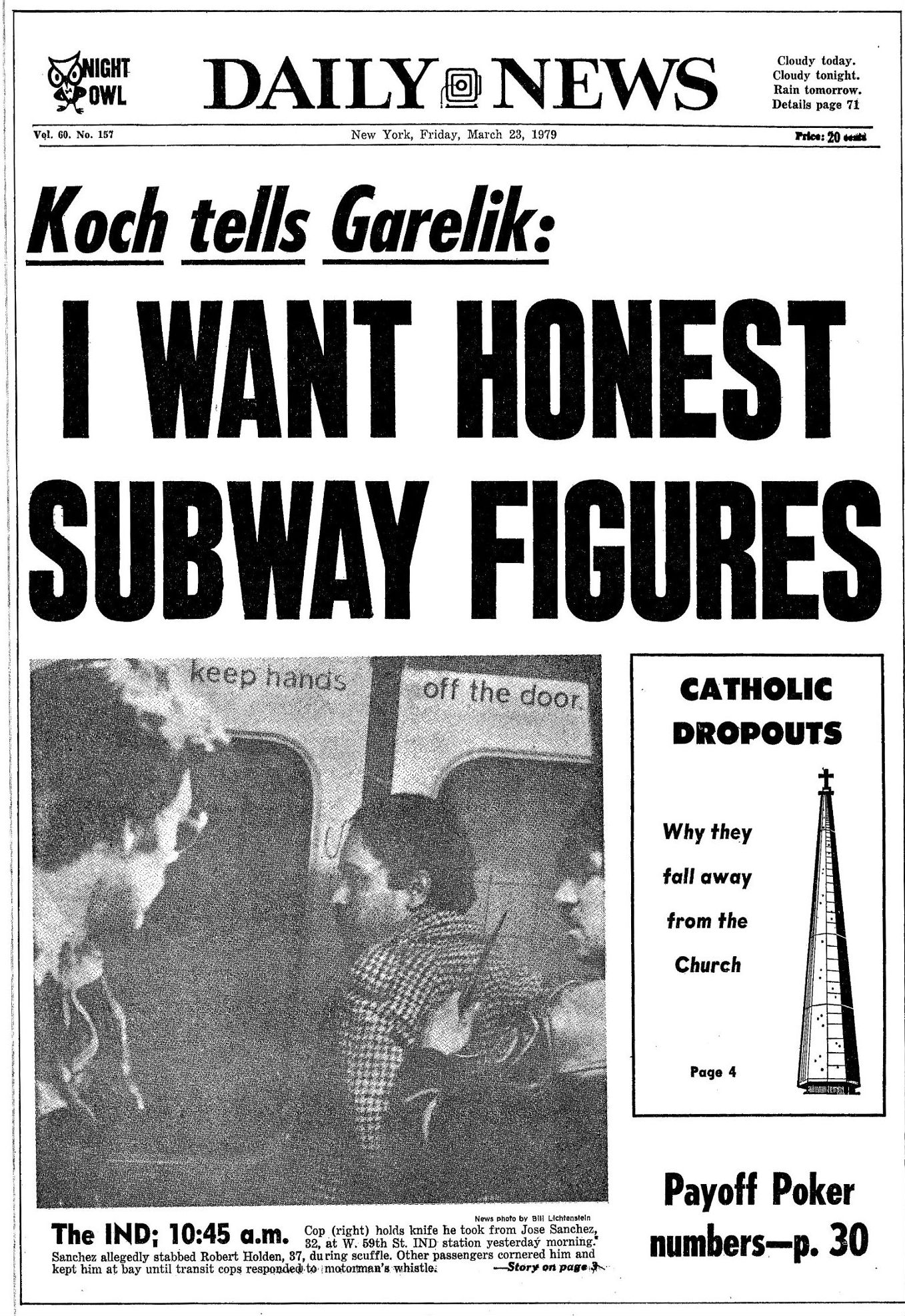I took this photo of a New York City subway stabbing, part of a wave of transit crimes that included Renee Katz, a flutist and student at the New York City High School of Music and Art, who was pushed onto the subway tracks at Eighth Avenue and 50th Street in Manhattan in 1979.

In the wake of eight murders in the subways, then-Mayor Ed Koch flooded subway trains and stations with 800 extra police officers. His transit police chief, Sanford Garelik, assured him that violent incidents in the subways were down, but there were charges that the TA was not being forthcoming with City Hall about the extent of the problem. And then this stabbing, in a midtown subway at midday, with police around. It was the breaking point for Ed Koch and Sanford Gerelik, a former mayoral candidate and city councilman. As the newspaper headline read:"Koch tells Gerelik: I Want Honest Subway Figures." Koch would remove Garelik not by firing him, but by moving the entire NYC transit police department to be under the control of the New York City police department, which was more effective in keeping riders safe.
I thought about this while watching the extraordinary interview Koch gave to The New York Times, that was to be released upon his death as part of the Times' "The Last Word" video series that videotapes self-obits from prominent persons. Koch tells an almost identical story to the TA situation about the city budget, and how when he was mayor he fought to get accurate fiscal figures from his staff when the city was nearly bankrupt, and then took immediate action to shore up the city finances.
These stories raise the obvious issue of the AIDS controversy, the details of which the Times now famously left out of its first 5,500 word Koch obit yesterday, and then clumsily added to the article with three new paragraphs, which among other things, refer to the "hundreds of New Yorkers" affected by AIDS, while, in fact, 100,000 New Yorkers have died from it to date. The Times "The Last Word" video, however, fails to mention the word AIDS even once, saying that the only black mark on Koch's 12-year term as mayor was the Donald Manes/Sheldon Silver corruption scandal, which kicked up a lot of dust and included Manes' suicide, but fell short of tainting Koch.
With Ed Koch's death, there are those who criticize him as evil for his failure to act on AIDS during the painful era now memorialized in David France's brilliant documentary How to Survive a Plague, and there are others who object to criticism being piled on an essentially honorable person in death. Likely, the true measure of Ed Koch is somewhere in the middle. But it leaves you wondering, what the course of the city, which lost 100,000 largely young men --many with great and bright futures ahead of them, and the country, which has lost more than 600,000 people to AIDS since the epidemic started, according to the CDC -- would have been, and who those lives would have touched and what they would have accomplished, had Ed Koch sounded the alarm and demanded answers in the early 1980s to what was called the mysterious "Gay Cancer" that was sweeping through New York taking lives. The Times' video interview also leaves one wondering the extent to which Koch's personal life may have played a role in his AIDS response or lack of it. In the interview, Koch recounts his reaction to the infamous Mario Cuomo for mayor posters bearing the homophobic slogan "Vote for Cuomo, Not the Homo" that appeared on Queens Boulevard when Koch ran against Cuomo for mayor in 1977. Koch in the interview said his response to the slur was to say his personal life was "none of your ficking business." But given the stakes, the speculation will always remain regarding the extent to which Koch's personal life might have influenced his public response to the AIDS crisis.
In the end, one has to believe that Koch, ever provocative as an attorney, community organizer, and politician, and later as the host of People's Court, radio host and movie reviewer, would relish the controversy that his death and its coverage has produced. The Times' video, hauntingly, begins with a clip of Koch, smugly posing the question to friends and foes alike, "Do you miss me?"
